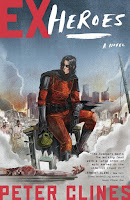If I can shamelessly namedrop a bit, I heard a great Richard Matheson quote from Jonathan Maberry a while back, which I will now paraphrase as such.
Writingis the art of telling stories. Publishingis the business of selling as many copies of that art as possible.
If you break it down, this collection of rants is probably 98% about writing, maybe 2% about publishing. This week, if I may, I’d like to step away from the straight writing stuff that I normally do and touch on an issue more on the publishing side of things.
Nobody here likes getting rejected. Not for an apartment, not for a job, not for a date. Definitely not for our writing. But that’s life. Rejection happens all the time, even to the folks who get considered professionals. I had a short story rejected from an anthology last year. I’ve been trying to pitch a book trilogy to my editor for two years now, and he’s just not interested. Heck, my agent’s not even that interested in it. These things happen.
I bring this up because there’s a meme, or sometimes an article, that floats around a lot, presenting a bunch of facts that go something like this…
“Famous writer X showed their manuscript Y to twenty-three editors before someone bought it. Not only that, bestselling novel Y2 by famous writer X2 was rejected by forty-two editors. Can you imagine that? Forty-two people passed on Y2? Ha ha ha, how many of them are kicking themselves now?”
This list can be ten or fifteen authors/books long, and I see it get used a lot to show how A) I shouldn’t give up hope just because of all my rejections, B) editors don’t know anything, C) the publishing industry is a dinosaur that’s going to die out any day now, just wait and see, or D) all of the above.
So, at first glance, this list can seem like a really awesome thing. It makes me feel more positive about rejection. It makes me feel more positive about that stupid editor’s decision. It validates my feelings about big publishing and their ongoing habit of ignoring my letters. And this is good, right?
Thing is, there’s three problems here. And I think they cause more issues than all this positive affirmation solves. Y’see, Timmy, this list isn’t as clear-cut as it seems…
First problem is the false parallel that often gets drawn because of this list. Carrie was rejected many times and my early book– The Suffering Map –was rejected many times. Therefore, logically, my book must be just as good (and just as worthy of being published) as Stephen King’s breakout hit.
We can all see the flaw there, right? Just because an editor rejected a good book doesn’t mean all the books they reject are good. Some of them—let’s be honest—some of them are not good. Some of them are bad. We can all probably name one or two folks who aren’t as good at writing as they think they are. And they can probably name two or three folks, too.
I can freely admit, I’ve had books rejected by agents. And they deserved to be rejected. They were awful. Honestly, in retrospect, I’m kind of ashamed I submitted one of them.
The next problem, to be blunt, is that writers don’t always send stories where they’re supposed to go. Sometimes we get overeager or don’t do all the research we should. If I’d sent Ex-Heroes to Harlequin, of course they would’ve rejected it. So would the Black Library (a very specific niche press), Razorbill (a young adult press), or Lonely Planet (a travel book publisher). Getting rejected from these places would be completely understandable, but would it really say anything about the quality of my writing? Or that editor’s ability to recognize good writing?
So should I consider those when I say that my book’s been rejected half a dozen times?
Heck, a while back I spoke with a woman online as she lamented that her story had been rejected four times. Ignoring the fact that four times is nothing, it turned out she’d submitted to four radically different markets. She’d tried marketing it as young adult, sci-fi, fantasy, and as a horror novel. Which really meant she’d been rejected once. Once as a young adult story, once as a sci-fi story, and so on.
Is that worth calling it quits over?
Also, there are some writers out there who… well, who can’t take a hint. They’re the literary equivalent of the guy who thinks if he keeps asking Phoebe out every Friday night, eventually she’ll break down and say yes. When an editor rejects a manuscript… that’s it. Unless they specifically ask to see it again, I shouldn’t try to sneak it back in their pile six months later. No, not even if I explain that I tweaked three of the chapters. My goal is to convince them I’m a professional, and that’s not how professionals work. But some people do it anyway, often the folks who tend to do “carpet bomb” submissions of twenty or thirty editors at a time.
If Phoebe rejects my advances twenty times, is that twenty rejections? Or is it just one (and I’m really bad at taking a hint)?
So rejection numbers don’t necessarily tell a complete story.
Finally, this list implies a really big misconception, something a lot of beginners (or willfully uninformed folks) don’t get. When they hear that bestselling author Wakko Warner was rejected thirty times, they make the assumption that Wakko sent out the exact same book with the exact same query letter thirty times. Thirty editors all saw the same book that got published, letter for letter, and every one of them passed on it.
As someone who’s made those rounds, I’d be willing to bet some serious cash that’s not true.
After a given number of rejections, a good writer’s going to take note that something isn’t working. It might be a low number, just two or three. It might be as high as a dozen. But only a really deluded person is going to keep doing the exact same thing again and again and expect the results are going to radically change.
Personally, I’d rewrite my cover letter after every fourth or fifth rejection. Sometimes it would be to update it with a new sale or credit. Other times I’d come up with a cleaner, slicker way to get a point across. All too often, it was to fix the typo that had slipped past three revisions and didn’t get noticed until after I sent things out. Whatever made me do it, it was rare for more than a handful of editors to get the exact same letter from me. And different people interpret those letters different ways
Not only that, if I was lucky enough to get any sort of feedback… I listened to it. I didn’t always follow it word for word, but if the people who were in the position to buy my stories offered suggestions, I considered them. The Suffering Mapwent through a pretty decent revision halfway through my submissions, and then another one right after I attended the SDSU Writers’ Conference.
Out of its dozen or so submissions, I’d guess at least three different versions of it went out under three or four different cover letters.
So, with all of this in mind… is it that amazing a particular book was rejected forty-two times?
It seems kind of, well, normal, doesn’t it?
It’s always fantastic to look back at the people who inspired us and how they got their start. If I want to walk that same path, though, I need to look at that start without any blinders or preconceptions. Which is going to make the path look a lot tougher.
But it’ll also make it easier to follow.
Next time…
I don’t know. Between the ranty blog and the Writers Coffeehouse, it feels like I’ve been going on and on about so many things, it all feels a bit repetitive to me. Is there an appropriate writing topic anybody’d like to hear me babble on about?
If not… I’ll put something together…
Until then, go write.





0 replies on “Rejected by Inspector #12”
How do you separate helpful feedback from criticism? I've had several people give me advice, a lot of which is contradictory. I have enough inner demons in my head without being confused by idiots who don't really like my genre anyway. But some of the advice may be good, just not what I want to hear.
So there's your topic. How do I separate good advice from bad?
That's not a bad idea. I touched on that once or twice in the past, but it'd be a good topic to go over again.
Probably not this week, but definitely next.
“You don't start out writing good stuff. You start out writing crap and thinking it's good stuff, and then gradually you get better at it.
That's why I say one of the most valuable traits is persistence.”
― Octavia E. Butler
Love the blog, but (myself included) most unpublished writers think their stuff is awesome and don't realize that it is crap. I know the first full length novel I wrote is crap compared to what I have wrote since. I know that it is better than some stuff that has been published, but it is still crap.
In fact, it wasn't until recently that I realized that I am terrible at writing Science Fiction and Fantasy. I love the genres and I love to read them, but I write crap that feels forced when I write them.
Instead, I started writing horror/ horrific fiction. I reads so much better than what I used to write.
Hopefully, I will be published, who doesn't want to be, but I am having a better time of developing my skill through writing in a different genre than my favorite.